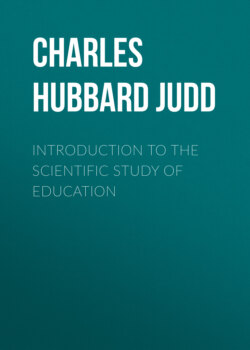Читать книгу Introduction to the scientific study of education - Charles Hubbard Judd - Страница 15
На сайте Литреса книга снята с продажи.
The Scientific Study of Educational Problems
ОглавлениеTable of Contents
Here, again, it is by no means asserted that the solution of the problem of training workers for the industries has been found. It can, however, be stated with complete assurance that both the school and the community will proceed with greater intelligence if the facts are carefully canvassed in advance.
The spirit of patient, detailed scientific study is more and more dominating the schools. There are some who, impatient at the labor involved in such studies, would rush forward to radical experimentation. Fortunately, even such rash reformers are becoming convinced that they need to keep records of their results in order to prove the success of the changes which they have made. As a result, they too are taking on some of the forms of science, though they do not adopt the full program of patient study of conditions.
The result of a scientific movement such as is under way in education will be the cultivation of a broader conception than was ever possible from any individual point of view. The pupil’s view is narrow because he comes in contact with the school only at the point of application of educational methods to his own life. The scientific view of education is broad because it places the school in its proper relations to other social activities, because it defines the relation of the pupils and teachers to one another and to the material used for instruction, and because it opens up all the results of school work to full inspection and evaluation. This broad scientific view is the one which the teacher and the community at large should adopt.
EXERCISES AND READINGS
In every school certain changes are introduced from time to time in spite of the conservatism of the community. Let the student find examples of (1) new courses of study, (2) new methods of appointing or promoting teachers, or (3) new forms of organization, such as the junior high school or departmental teaching. After discovering innovations, let him find how they were brought about.
What are the usual forms of school records and reports known to the student? How could records be made of more value? Suggest methods of presenting the facts of daily attendance so that they can be readily interpreted by a community. What are some of the interpretations that ought to be put on failures and nonpromotions in different kinds of cases? Is repetition of a course desirable for a pupil who has failed? Are failures more common in required courses than in elective courses? When a required course is described as essential to the education of everyone, what is meant?
Let the student test his own rates of reading. How should a college class differ from a high-school class in ability to read? Go to a library or study-room and watch the people read. Report the differences between individuals.
The readings which are most stimulating to students who have never faced the problems of school organization are those which call in question present school practices.
Dewey, John. The School and Society. The University of Chicago Press. This is one of the most stimulating demands for a reorganization of the school which has ever been written.
Rousseau, Jean Jacques. Émile. D. Appleton and Company. This is a book of great historical significance. It is an indictment of formalism in education and a vigorous advocacy of naturalism.
Spencer, Herbert. Essays on Education. D. Appleton and Company. This is a demand for a thorough reform of the school curriculum. It is now nearly sixty years old, but it is modern in its spirit.
